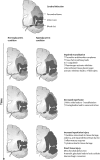Diabetes and the brain: issues and unmet needs
- PMID: 24777546
- PMCID: PMC4064119
- DOI: 10.1007/s10072-014-1797-2
Diabetes and the brain: issues and unmet needs
Abstract
Diabetes mellitus (DM) is associated with an increased risk of mild cognitive impairment, dementia and stroke. The association between DM and dementia appears to be stronger for vascular cognitive impairment than for Alzheimer's disease, suggesting cerebrovascular disease may be an important factor in cognitive impairment in DM. Although the exact mechanisms by which DM affects the brain remain unclear, changes to brain vasculature, disturbances of cerebral insulin signaling, insulin resistance, glucose toxicity, oxidative stress, accumulation of advanced glycation end products, hypoglycemic episodes, and alterations in amyloid metabolism may all be involved. Cognitive impairment and dementia associated with DM may also be mediated via vascular risk factors, in particular brain ischemia, the occurrence of which can have an additive or synergistic effect with concomitant neurodegenerative processes. To date, no drug has been approved for the treatment of vascular dementia and there are no specific pharmacological treatments for preventing or reducing cognitive decline in patients with DM. Most focus has been on tighter management of vascular risk factors, although evidence of reduced cognitive decline through reducing blood pressure, lipid-lowering or tighter glycemic control is inconclusive. Tailored, multimodal therapies may be required to reduce the risk of cognitive dysfunction and decline in patients with DM. The use of pleiotropic drugs with multimodal mechanisms of action (e.g., cerebrolysin, Actovegin) may have a role in the treatment of cognitive dysfunction and their use may warrant further investigation in diabetic populations.
Figures



Similar articles
-
Cognitive decline and diabetes: a systematic review of the neuropathological correlates accounting for cognition at death.J Neurol Neurosurg Psychiatry. 2022 Mar;93(3):246-253. doi: 10.1136/jnnp-2021-328158. Epub 2022 Jan 27. J Neurol Neurosurg Psychiatry. 2022. PMID: 35086942
-
Diabetes mellitus and dementia.Diabetes Metab. 2006 Nov;32(5 Pt 1):403-14. doi: 10.1016/s1262-3636(07)70298-7. Diabetes Metab. 2006. PMID: 17110895 Review.
-
Inside the Diabetic Brain: Role of Different Players Involved in Cognitive Decline.ACS Chem Neurosci. 2016 Feb 17;7(2):131-42. doi: 10.1021/acschemneuro.5b00240. Epub 2015 Dec 29. ACS Chem Neurosci. 2016. PMID: 26667832 Review.
-
Blood Brain Barrier Injury in Diabetes: Unrecognized Effects on Brain and Cognition.J Neuroimmune Pharmacol. 2017 Dec;12(4):593-601. doi: 10.1007/s11481-017-9752-7. Epub 2017 May 29. J Neuroimmune Pharmacol. 2017. PMID: 28555373 Free PMC article. Review.
-
Progression of brain atrophy and cognitive decline in diabetes mellitus: a 3-year follow-up.Neurology. 2010 Sep 14;75(11):997-1002. doi: 10.1212/WNL.0b013e3181f25f06. Neurology. 2010. PMID: 20837967 Clinical Trial.
Cited by
-
Prevalence of Cognitive Impairment and Associated Factors Among Diabetes Mellitus Patients Attending Follow-up Treatment at Fiche General Hospital, North Ethiopia.SAGE Open Nurs. 2024 Jan 29;10:23779608241227752. doi: 10.1177/23779608241227752. eCollection 2024 Jan-Dec. SAGE Open Nurs. 2024. PMID: 38292043 Free PMC article.
-
Cognitive impairment before and after intracerebral haemorrhage: a systematic review.Neurol Sci. 2020 Mar;41(3):509-527. doi: 10.1007/s10072-019-04150-5. Epub 2019 Dec 4. Neurol Sci. 2020. PMID: 31802344
-
Anxiety, Depression, and the Microbiome: A Role for Gut Peptides.Neurotherapeutics. 2018 Jan;15(1):36-59. doi: 10.1007/s13311-017-0585-0. Neurotherapeutics. 2018. PMID: 29134359 Free PMC article. Review.
-
Clinical Characteristics for the Relationship between Type-2 Diabetes Mellitus and Cognitive Impairment: A Cross-Sectional Study.Aging Dis. 2015 Aug 1;6(4):236-44. doi: 10.14336/AD.2014.1004. eCollection 2015 Aug. Aging Dis. 2015. PMID: 26236545 Free PMC article.
-
Towards the concept of disease-modifier in post-stroke or vascular cognitive impairment: a consensus report.BMC Med. 2017 May 24;15(1):107. doi: 10.1186/s12916-017-0869-6. BMC Med. 2017. PMID: 28539119 Free PMC article.
References
Publication types
MeSH terms
LinkOut - more resources
Full Text Sources
Other Literature Sources
Medical

